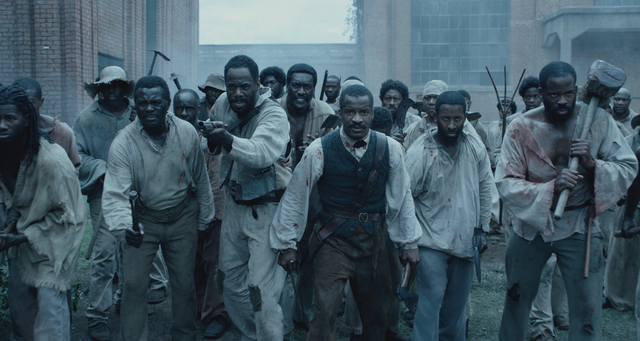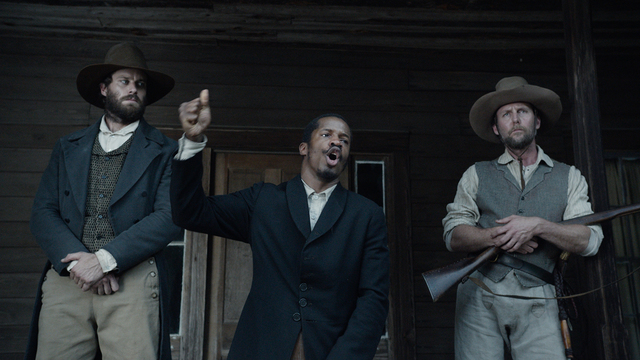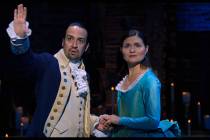‘Birth of a Nation’ not a great film, but a brutally effective one



There’s nothing comfortable about “The Birth of a Nation,” the story of Nat Turner (writer-director Nate Parker) and the 1831 slave rebellion he led in Virginia.
Not the atrocities that were committed against Turner and his fellow slaves.
Not the fact that, in Parker’s telling, Turner firmly believed he was called by God to murder slave owners while they slept.
Not the fact that the movie’s most intentionally powerful line — “They killin’ people everywhere for no reason at all but bein’ black” — rings nearly as true today as it did then.
And certainly not the increasingly enraged “kill that (expletive)” heard in the audience during some of the more upsetting scenes.
The passion project from untested filmmaker Parker made headlines in January when it was acquired at Sundance amid the #OscarsSoWhite furor for a record $17.5 million. (The previous benchmark was the $10.5 million spent on “Little Miss Sunshine” back in 2006.)
It seemed like — and still may become — Oscar bait, especially coming just two years after “12 Years a Slave” won the best-picture Oscar. But that was more powerful and artful than the raw, blunt “The Birth of a Nation.”
Nat was gifted as a child, so much so that when his reading skills become known, the plantation owner’s wife, Elizabeth Turner (Penelope Ann Miller), brings him to live in the main house where she encourages his talents. When Nat reaches for a book, though, he’s quickly reprimanded. “Those books are for white folks,” she says. “They’re full of things your kind wouldn’t understand.”
So she hands him the only book he’d ever need: a Bible.
On his deathbed, though, Elizabeth’s husband declares that Nat would be more valuable in the fields, so after a brief era of relative comfort, he’s sent to pick cotton, leaving his young, soft hands dripping with blood.
Years later, with his childhood friend Samuel (Armie Hammer) now his master, Nat sees Cherry (Aja Naomi King), a broken, almost feral slave on the auction block, takes pity on her and, as a way to give her a somewhat better life, convinces Samuel to buy her as a wedding present for his sister, making her the human equivalent of a Crock-Pot.
Nat and Cherry are soon married, have a child, and Nat begins making a name for himself as a preacher.
With a lingering drought and talk of insurrection in the area, Reverend Wathel (Mark Boone Jr.) convinces Samuel he can make enough money to save his troubled, once-grand homestead by sending Nat from farm to farm, preaching the rewards of a submissive life to the slaves. But in doing so, and seeing his fellow slaves being treated increasingly worse, their plight begins wearing on Nat’s soul.
He sees a little while girl skipping along, her slave following with a rope tied around her neck like a dog. His onetime friend Samuel has him lashed to a bloody mess for baptizing a white man. And Cherry is savagely beaten, and presumably raped, by slave catchers (led by Jackie Earle Haley) even though she was on her master’s property.
Finally, Nat realizes that for every Bible verse about obedience he’s been told to preach, there’s a counter one about the evils of slavery. And soon, a rebellion that would kill roughly 60 white men and women — and lead to the deaths of far more black men and women, both slaves and free persons — was hatched.
The whole thing is nearly as troubling as it is powerful.
The slave owners certainly needed to answer for their evil deeds, but Nat and his men murdering them in their beds while using the Lord’s name doesn’t exactly feel heroic.
And there was a palpable sense of bloodthirstiness in the audience.
Is “The Birth of a Nation” a great movie? No. But it’s a brutally effective one.
And it’s the furthest thing from comfortable.
Contact Christopher Lawrence at clawrence@reviewjournal.com. On Twitter: @life_onthecouch.
Review
Movie: “The Birth of a Nation”
Running time: 110 minutes
Rating: R; disturbing violent content, and some brief nudity
Grade: B
Now playing: At multiple locations












